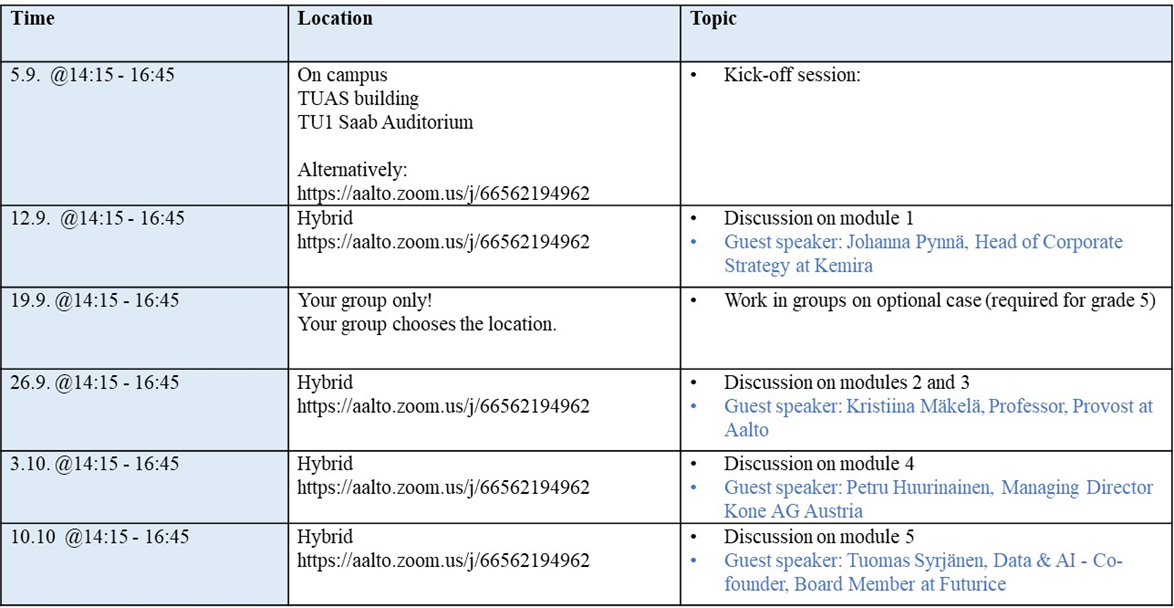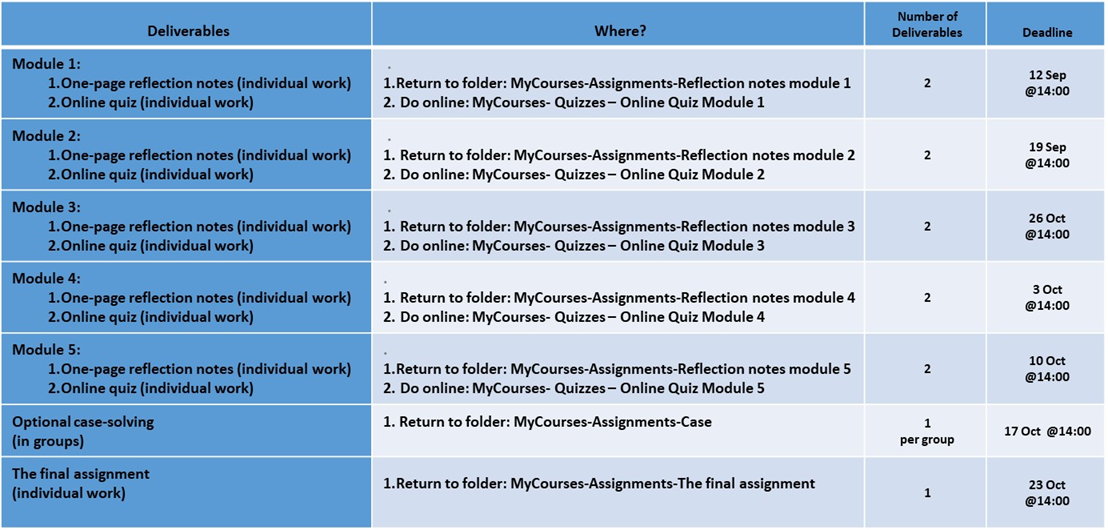TU-E3041 - Leadership and Change Management D, Lecture, 5.9.2022-10.10.2022
This course space end date is set to 10.10.2022 Search Courses: TU-E3041
Översikt
-
Welcome to the Leadership and Change Management course!The course will be held in a hybrid format (on campus and via Zoom).
Join Zoom Meeting here: https://aalto.zoom.us/j/66562194962
Participation in sessions is not mandatory. You can take the course as guided self-study.We, however, hope to see you in the class room or on Zoom where we will have insightful discussions and opportunities to ask questions from our guests from the industry, who will share their experiences and knowledge.The instructors:Assistant Professor Natalia VuoriPostdoctoral Researcher Barbara BurkhardThe course assistant:Teemu SurakkaLearning objectivesYou will go way with
- Understanding what motivates people
- Knowing various leadership styles and understanding when and how to use them
- Understanding organizational changes
- Understanding the challenges that employees face during every kind of organizational changes
- Knowing how to manage employees during these organizational changes
ContentThe course is organized into 5 modules. 1, 2, and 3 modules cover the Leadership part. 4 and 5 modules cover Change Management.
- Motivation Theories & Self-Determination Theory
- Situational Leadership & Leader-Member Exchange Leadership
- Transformational Leadership
- Changes in organizations (I)
-
Changes in organizations (II)
How the course is organized
For each of the five modules, we will provide videos and readings (book chapters and articles).You can watch videos and read the material when it is most convenient for you.However, for each module, you need to return reflection notes and do online quiz.The DLs are strict!!!Learning contractBy taking this course, you enter into a learning contract with me. Here are our mutual promises:
What I promise:
•Provide materials and tools that help you achieve learning objectives•Design the course in a way that allows you to learn and simultaneously provides you with the flexibility to pass the course tailored to your ambitions and personal schedule in these difficult times•Help you with all practicalities•Give each of you an equal opportunity to finalize the course and learn contentWhat you promise:
•Be responsible for your own learning: read all materials, watch all videos, reflect and think, return assignments•Not to take shortcuts or copy&paste from others•If you decide to do an option case group solving, do your share of the work in the (optional) group case-solving exerciseSchedule Deliverables
Deliverables
For each of the five modules, you will need to submit (1) a one-page reflection note (individual work) and (2) solve an online quiz (individual work).
One final assignment (3) (individual work)
In addition, there is (4) an optional case-solving exercise (in groups).
(1) Reflection notes
You need to submit a one-page reflection note using the Cornell method for note-taking. Here is a link to the video that explains how to use this method:
This method helps you reflect on and better organize the study material.
Click on Assignments and then Reflection notes to submit the reflection note (if you use pen and paper you can take a picture of your notes with your phone and upload that).
(2) Online Quizzes
The online quizzes consist of 8-15 multiple-choice questions about the study material. You can see whether you answered all questions correctly after submitting your answers, and you can redo the quizzes as many times as you like.
Click on the Quizzes folder to see the questions and submit your answers. Not available yet, we will let you know when you can start taking the online quizzes.
(3) Final assignment
This is individual work. The instruction TBA
(4) Group case-solving (Optional)
This part of the course is optional. It involves solving a case in a group.
These deadlines are strict. No late submissions will be accepted.
Quizzes and reflection notes take time. Start working on them early enough!
Grading policy
Up to 40 points are given for the following elements
- Reflection notes (individual work): 10 points
- Online quizzes (individual work): 10 points
- Final assignment (individual work): 15 points
- Group case-solving (in groups): 5 points (optional)
Each reflection note and each online quiz are graded from 0 to 2, so you can get a maximum of 20 points from these.
Reflection notes
To pass, it needs to be visible that you have spent some effort reflecting on both videos and readings. Submissions with mostly white space, with just a few words, or obviously copied&pasted from elsewhere are graded 0. Reflecting on videos ONLY are graded as 0.
Online quizzes
You can redo the quizzes as many times as you like, but you must answer all multiple-choice questions correctly to pass and get 2 points.
Final assignment
The questions for the final assignment are available in the Resources folder.
Group case (optional)
The instructions are available in the Resources folder.
Final grades are given as follows:
- <20: FAIL
- 20-23: 1 (but must return Final assignment)
- 24-27: 2
- 28-31: 3
- 32-35: 4
- 36+: 5
Attention:
- To pass, you must return the final assignment and get at least one point (so you can’t pass just with reflection notes and online quizzes, even if you get 20 points from them).
- You can get at most 4 without doing the optional group case-solving
- All points will be communicated through the course website (under Grades)
-
Slides of Course Introduction Fil PDF
-
Module 1: Motivation & Self-Determination Theory Mapp
Study Materials:
1) Watch the video on motivation theories. SORRY about the quality. We are working to improve it.
Slides on motivation theories without audio
2) Watch the video on self-determination theory
Slides on self-determination theory without audio
3) Read the article by Grant & Berry. "The necessity of others is the mother of invention: Intrinsic and prosocial motivations, perspective taking, and creativity." Academy of management journal 54.1 (2011): 73-96.
Deliverables:
1) Submit one-page refection notes to the folder Assignment 1. Use the Cornell method for note-taking to make one-page reflection notes.
2) Complete online Quiz 1
-
Online Quiz - Module 1 Kunskapstest
-
Reflection notes - Module 1 Inlämningsuppgift
-
Module 2: Situational Approach to Leadership & Leader-Member Exchange Leadership Mapp
-
Online Quiz - module 2 Kunskapstest
-
Reflection notes - Module 2 Inlämningsuppgift
-
Module 3: Transformational Leadership Mapp
-
Online Quiz - Module 3 Kunskapstest
-
Reflection notes - Module 3 Inlämningsuppgift
-
Module 4 Change Management I Mapp
-
Online Quiz - Module 4 Kunskapstest
-
Reflection notes - Module 4 Inlämningsuppgift
-
Module 5 Change management II Mapp
-
Reflection notes - Module 5 Inlämningsuppgift
-
Online Quiz - Module 5 Kunskapstest
-
Groups for optinal case solving Gruppval
-
-
Case solving return box Inlämningsuppgift
-
Mandatory final assignment Mapp
